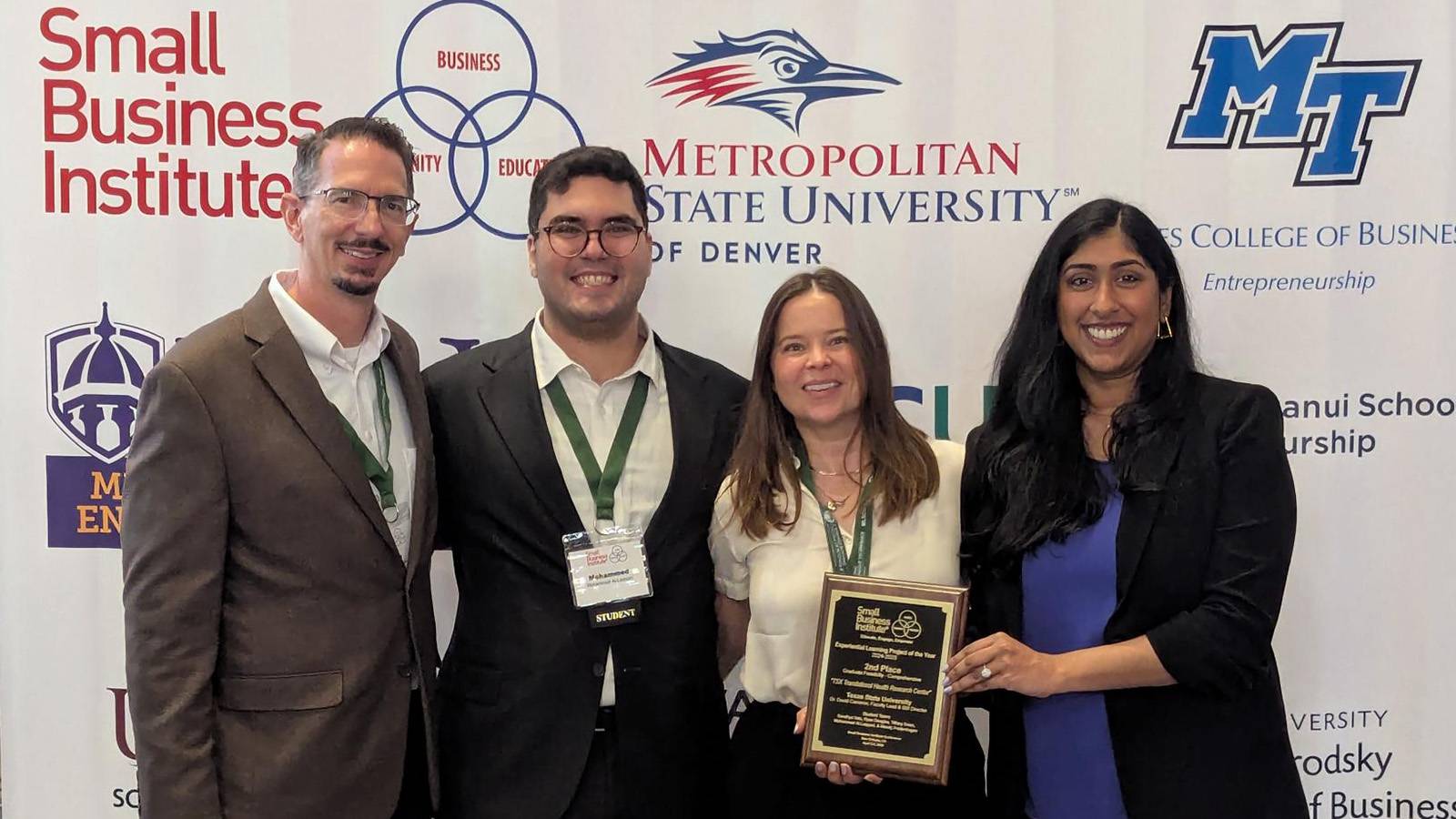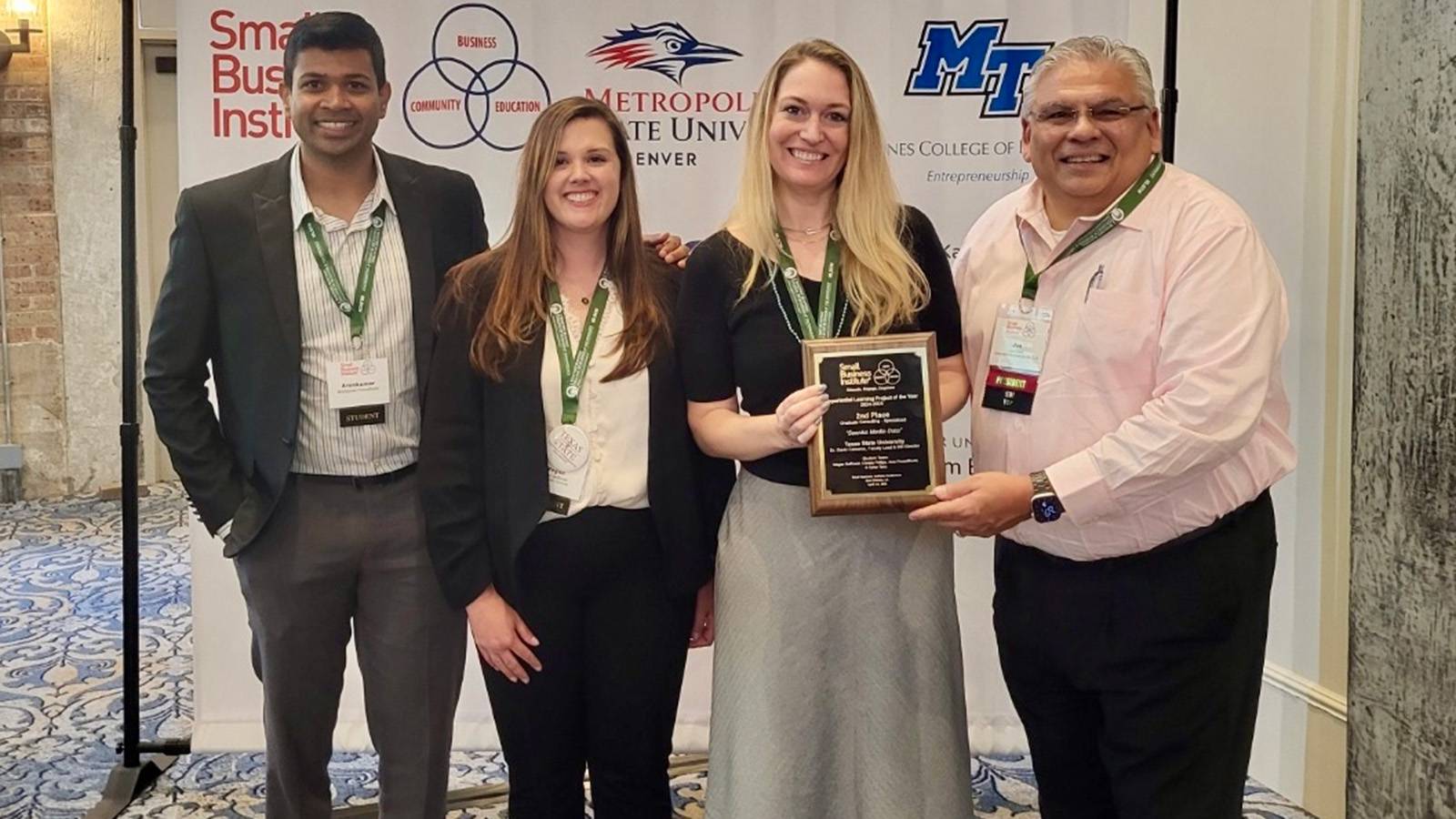
By Vallie Figueroa
Communications Specialist
McCoy College of Business
SAN MARCOS, Texas — Two Master of Business Administration (MBA) capstone teams at the McCoy College of Business earned national recognition at the 2025 Small Business Institute (SBI) Conference in New Orleans, held April 2-5.
The teams, which completed their capstone projects in the spring and fall semesters of 2024, submitted their project reports and presented at a poster session at the conference and earned second-place awards in their respective categories for Project of the Year.
Dr. David Cameron, associate professor of instruction in management and course coordinator for the MBA 5313 Capstone course, led the teams. Cameron submitted the students' projects for the SBI competition post-graduation.
"The conference is a national conference with the Small Business Institute, which… has for many years advocated for adoption of the experiential learning program," Cameron said. "[Which is] learning by doing."
Cameron said the projects are live consulting projects with a real client. The projects are typically sponsored by companies that have a business challenge or opportunity and are open to working with students. Any company can apply for an MBA Project by contacting corporate, alumni, partnership manager, Wendi Rios, at the university. The students work closely with project sponsors throughout the 15-week project to understand the business challenges and develop solutions to help them achieve their goals.
"That's the nature of this project," Cameron said. "It's really a student-driven project in which they not only define the project but also develop creative, fact-based solutions to help the client achieve their goals. I like to say what we offer to the sponsors is an opportunity to work with an MBA student team to understand the situation and then, through their research and analysis, provide insight and fresh perspectives to help the sponsor company make progress."
Team One: Bobcat Biochar Commercialization with THRC
The first team, sponsored by Texas State's Translational Health Research Center (THRC), won second place in the Comprehensive Graduate Feasibility category. Led by Sandhya Velu, with team members Ryan Douglas, Tiffany Swan, Mohammed Al-Laqqani, and Mandy Fredenhagen, the team conducted a study to help THRC commercialize an innovative soil additive, known as biochar.
Biochar is an ancient soil amendment that uses biomass, such as wood and plant mass, and is then heated to produce a porous charcoal-like substance. It is then infused with beneficial microorganisms and hydrated with compost before being added to arid, low-nutrient soil caused by over-farming.
The MBA consulting team worked closely with THRC fellows Dr. Nicole Wagner and Cassaundra Melgar C'De Baca to build a business and marketing plan to develop and commercially sell Bobcat Biochar. The natural additive, produced at the Freeman Center, a closed research facility that provides 3,500 acres of Hill Country habitat and on-site facilities as part of Texas State University, is a sustainable soil amendment designed to retain water, capture nutrients, and improve soil vitality, which Cameron said is critically important in drought-prone regions like Texas and California.
"We got to see the equipment they're using to make the biochar," Douglas said. "That was a big turning point for us, to actually see what they were making it with and how they're doing things."
Their project proposed a year-long minimum viable product (MVP) study involving local master gardeners to test the product and offer feedback to the THRC team. This feedback is designed to help transition the biochar from lab research to commercial viability.
"They realized that the market is pretty fragmented and not well developed," Cameron said. "Through real market feedback, they could get the market intelligence they needed because it has to go from the lab, which is kind of a unique environment, into the real world environment."
Velu noted that the project's dynamic nature and the challenges the team faced throughout the semester served as pillars of growth for the team even before presenting at the SBI conference.
"We had a very complex project and a few setbacks," she said. "The scope of the project changed constantly, even up until the time that we presented. During the defense, there was a mini competition within the class, and we were the underdogs, and somehow we won first in that competition. That was really rewarding."
Team Two: Market Entry Strategy with Seenka Media Data
The second team, sponsored by Seenka Media Data, an Argentinian media analytics firm, placed second in the Specialized Graduate Consulting category. The team included team lead Megan Belflower, Christa Phillips, Arun Poosaithurai, and Dylan Terry. Their capstone project involved building a U.S. marketing plan to introduce the firm to the U.S. market, focusing on Hispanic consumers. The team traveled to Argentina as part of the optional capstone study abroad program. They visited Argentinian companies across various industries, including Seenka.
Belflower described the experience with Seenka CEO Pablo Verdenelli as supportive and enlightening.
"We spent a few nights while we were in Buenos Aires doing work on our project over a dinner of empanadas and wine," she said. "That helped set the stage for our success. We spent 3-4 hours with our sponsor [Pablo] while we were in Buenos Aires... and he shared a quote with us that resonated with our team. 'Music has always been music. The Beatles are the Beatles in the '60s, the '80s, and today. What has changed is not the music itself, but the technology we use to listen to it.' The same is true for marketing."
According to its website, Seenka integrates organic and paid exposure across traditional, digital, and social media to detect opportunities, optimize campaigns, create multi-attribution models, and discover customers and potential audiences. The company utilizes a dashboard that uses real-time media data to analyze media mentions and audience sentiment.
"If you think about it like you're Budweiser and you're launching a Super Bowl ad, within seconds after your first ad airs on TV, you could go into the dashboard and start seeing social media influences, news posts, and the sentiment analysis behind the ad you just launched," Belflower said. "You can also use it to look at your competitors. So if you're Budweiser and Coors Light puts an ad in the Super Bowl, you want to see what the reaction is to that ad too, and then be able to compare it to the reaction to your ads. You're able to do that in real time. As media, it's just a constant flow."
Belflower said that after analyzing the U.S. market, the students proposed San Antonio as an ideal launch city based on demographic analysis and the competitive landscape. The recommendation included a detailed marketing plan and market segmentation strategy.
"Seenka is a very interesting company," she said. "They wanted to expand their business to the U.S., but focus specifically on the Hispanic market," she said. “It just so happened that the city we found most appropriate for them was San Antonio.”

Cameron praised both teams for taking on the challenge. "You start these students on something like THRC biochar and Seenka media intelligence projects, but ‘How much do they know about that walking in? Like zero.’ And so, all of a sudden, they have 12 weeks to figure it out. They have to trust the process, engage with the sponsor, and do a lot of hard work. I think they come out of this with more confidence … with a greater appreciation of their own abilities based on a sense of accomplishment. And I think winning the award reinforces all that."
Elevating the MBA Program, Increasing Visibility to the University
The recognition from the SBI conference reflects the McCoy College's robust MBA program and the extensive opportunities for students to learn beyond the classroom.
"It shows that the MBA teams at Texas State are doing good work," Cameron said. "It's recognized by a national conference of peers who do similar kinds of experiential projects. It's something that the university is proud of."
For students like Belflower, who has worked at Dell for over a decade, the capstone project was an eye-opening experience.
"Professionally and just intrinsically, it helped prove to myself that I was capable of more and truly good at leading," she said. "I'm really proud of the team for the work that they put into this project. That's what really set us apart, and that's what helped us get to SBI.
Douglas emphasized that the challenges and pressure of the capstone project replicated professional environments.
"This project was a mirror image of the role I moved into once I graduated, and that there's a lot of ambiguity," Douglas said. "There were some things [in the capstone project] that were not clearly defined and it's up to each student to kind of work their way through the process and figure things out, and that's exactly what you run into in the real world."
Velu added that the university's support made a difference.
"McCoy [College of] business school is wanting to invest in their students and highlight the success of their students," Velu said. "The leadership [at McCoy College] very much cares about the students, and I think in turn that lends itself to what we're seeing here now, where we're getting support we need to actually even try to compete at the national level."
Dr. Jana Minifie, a McCoy College management professor, who has been the Project of the Year vice president for the last five years and coordinates the competition on behalf of SBI said the university’s submissions to the competition have been “successful because of the quality of the student work under the direction of David Cameron and Peg Richmond. It is because of the faculty that supports their students in competitions, such as SBI, and is focused on helping others succeed. It's not about the faculty member, but about the lessons learned and growth by the students.”
Both teams demonstrated the value of experiential learning.
“It is a recognition of the quality of work that our MBA students are doing,” said Dr. Diego Vacaflores, associate dean for graduate programs at McCoy College. “Going to this SBI National conference and competing with teams from the rest of the country, this is a great recognition for our students.”
Vacaflores continued: “It is a great experience for the students. They learn from real-world business challenges. When they present in the class, it's one thing, but when they go to a national conference, that really says that whatever they're doing is of the highest quality. The students were so proud to receive this award, this recognition, so we will continue to do it and we'll do it better every time we can.”
As Cameron said, the capstone project "gives them a platform where they can use all their MBA tools and their collective work experience to help the project sponsor solve real problems. It’s challenging and exciting! They grow from the experience, and it is something they can take with them for their future careers.” ✯
For more information about this story or other news, email Vallie Figueroa, communications specialist for the McCoy College of Business, at vlf23@txstate.edu.
About the McCoy College of Business
Established in 1970, Texas State’s business school officially became the McCoy College of Business in 2004 following a transformational gift of $20 million by Emmett and Miriam McCoy. The college, which offers classes in San Marcos, Round Rock, and online, is accredited by AACSB in both business and accounting, and has graduated more than 45,000 alumni.
Marketing and Communications
McCoy Hall 322
Texas State University
601 University Drive
San Marcos, TX 78666
512.245.2990